Trump's expansionist remarks widely rebuked
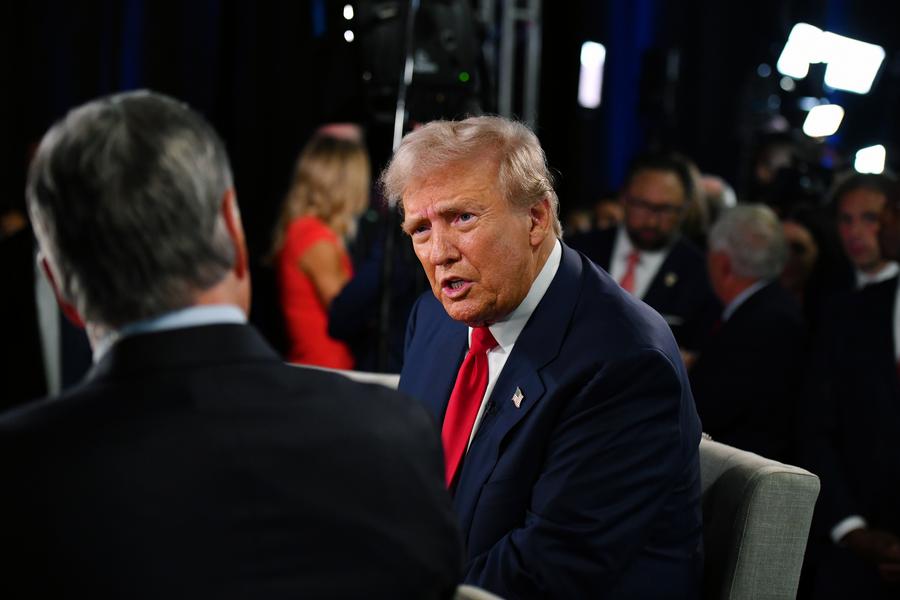
Former U.S. President Donald Trump (C) is interviewed at the U.S. presidential debate spin room after the first presidential debate with U.S. Vice President Kamala Harris in Philadelphia, the United States, on Sept. 10, 2024. (Xinhua/Li Rui)
State leaders have spoken out against U.S. President-elect Donald Trump's expansionist remarks.
WASHINGTON, Jan. 10 (Xinhua) -- With his second term yet to begin, U.S. President-elect Donald Trump has made a series of expansionist remarks, including plans to make Canada a U.S. state, rename the Gulf of Mexico, and gain control of the Panama Canal and Greenland.
In response, leaders from the countries he has targeted have spoken out, firmly rejecting his claims.
HOW ABOUT "MEXICAN AMERICA"?
At a press conference on Tuesday, Trump announced his intention to rename the Gulf of Mexico to the "Gulf of America," a name he said has a "beautiful ring to it."
"We're going to change because we do most of the work there, and it's ours," Trump said. "It's appropriate, and Mexico has to stop allowing millions of people to pour into our country."
Mexican Economy Minister Marcelo Ebrard rejected Trump's suggestion to rename the shared water body later on Tuesday.
"Today, I'd tell you if we saw each other in 30 years, the Gulf of Mexico will still be called the Gulf of Mexico," said Ebrard.
Mexican President Claudia Sheinbaum responded to Trump's proposal with sarcasm. During her daily press briefing on Wednesday, with a world map behind her, Sheinbaum jokingly proposed that North America be renamed "America Mexicana," or "Mexican America," citing an 1814 document predating Mexico's constitution that used this name for the region.
"That sounds nice, doesn't it?" she said.
Sheinbaum also pointed out that the Gulf of Mexico has been known as such since 1607, with the United Nations officially recognizing the name.
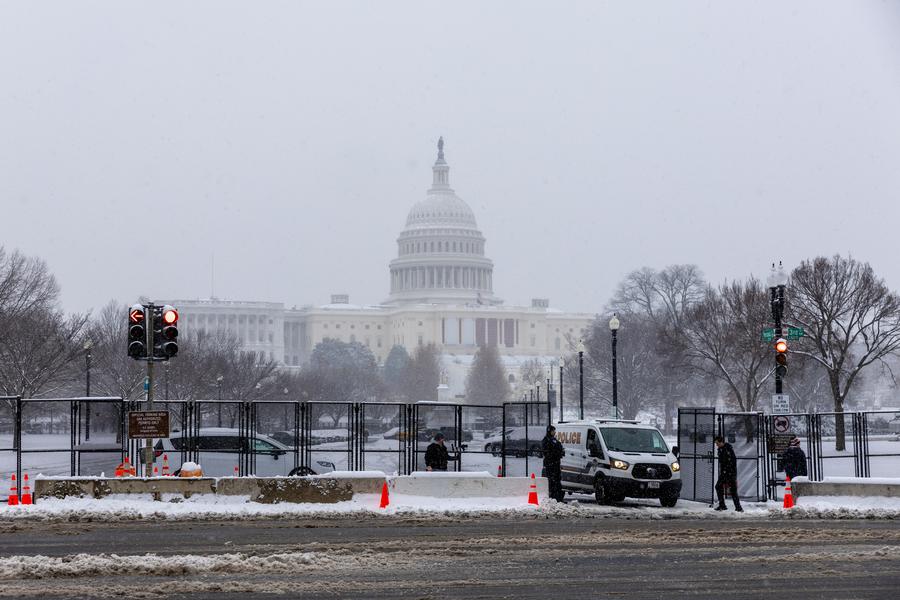
The U.S. Capitol building is pictured in Washington, D.C., the United States, on Jan. 6, 2025. (Xinhua/Hu Yousong)
GREENLAND "NOT FOR SALE"
Greenland, the world's largest island with a population of roughly 60,000, is a self-governing territory of Denmark. Its vast natural resources, including oil, gas, and rare earth elements, along with its location in the Arctic Circle, make it a key player in the region with great strategic value.
Trump's interest in Greenland dates back to his first presidential term. In 2019, he proposed purchasing the territory, a move Denmark swiftly rejected and dismissed as "absurd" by Danish Prime Minister Mette Frederiksen.
On Tuesday, Trump said he would not rule out using military or economic measures to acquire the island. "We need Greenland for national security purposes," he declared, threatening to impose high tariffs on Denmark.
Greenland has made it clear that the island is "not for sale and will not be in the future either," said Frederiksen on Tuesday. "I don't think it's a good way forward to fight each other with financial means when we are close allies and partners."
At a press conference late Thursday, the prime minister mentioned that the Danish government had requested a phone call with Trump following his controversial remarks on Greenland, but no official response had been received.
Frederiksen added that Denmark currently had no reason to believe Trump would act on his statements, while Foreign Minister Lars Lokke Rasmussen said: "We should take him seriously, but not literally."
Some European leaders have also warned against Trump's recent remarks regarding Greenland.
German Chancellor Olaf Scholz said that the inviolability of borders is a fundamental principle of international law, which applies to every country, regardless of its size or power. He said that in discussions with European partners, there was a lack of understanding regarding recent statements from the United States.
France's Foreign Minister Jean-Noel Barrot warned of the resurgence of "might makes right" policies, calling on Europe to bolster its strength. Speaking to France Inter radio, Barrot noted that Greenland is a "territory of the European Union and of Europe."
"It is undoubtedly no way that the European Union would let other nations of the world, whoever they are, attack its sovereign borders," he said.
Norwegian Prime Minister Jonas Gahr Store on Thursday warned of the potential threat to NATO unity and European stability.
"It is unacceptable to suggest the use of military force against an ally or to imply intentions to claim territories under another nation's sovereignty," Store told national broadcaster NRK.
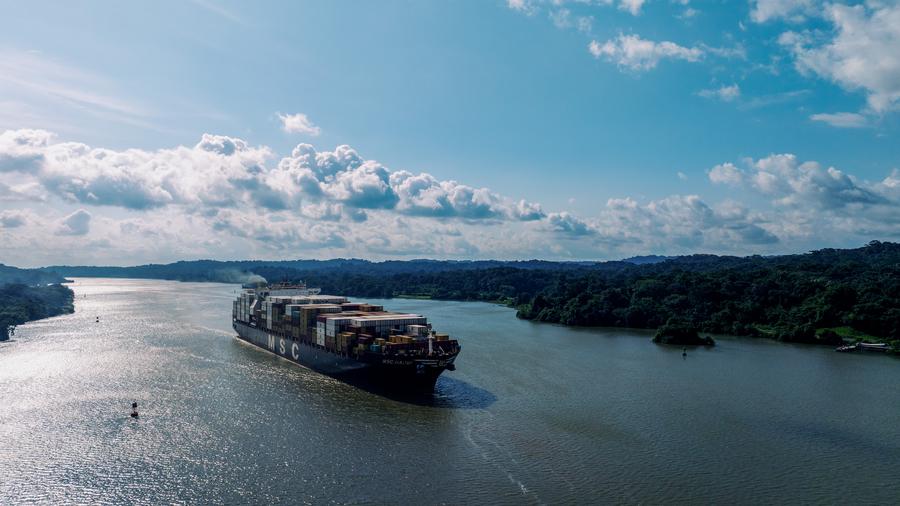
A drone photo shows a cargo vessel sailing on the Panama Canal near Panama City, Panama, Aug. 28, 2024. (Xinhua/Li Muzi)
PANAMA CANAL'S OWNERSHIP "NOT NEGOTIABLE"
In mid-December, Trump floated the idea of retaking control of the Panama Canal if Panama does not decrease toll rates for U.S. ships crossing the artificial waterway connecting the Pacific and Atlantic Oceans.
The canal remained under control of the United States until the Torrijos-Carter Treaties expired on Dec. 31, 1999, when the United States returned the complete administration of the canal to Panama.
Panama has repeatedly rebuked Trump's threats. "I want to express precisely that every square meter of the Panama Canal and its adjacent area belong to Panama, and will continue belonging to Panama," Panamanian President Jose Raul Mulino posted on social media platform X last month.
On Tuesday, in response to Trump's renewed comments about the canal, Panamanian Foreign Minister Javier Martinez-Acha told reporters, "The only hands that control the canal are Panamanian, and that's how it will continue."
Former foreign ministers from various Latin American countries have expressed their support for Panama's sovereignty over the canal. In a joint statement, over 20 former foreign ministers from more than 10 Latin American countries noted that Panama's sovereignty and independence over the Panama Canal are "not negotiable."
"It is indisputable that the Republic of Panama and its people have managed the Canal responsibly, guaranteeing its contribution to international maritime trade and global economic development, which constitutes a symbol of Latin American autonomy and pride," they noted.
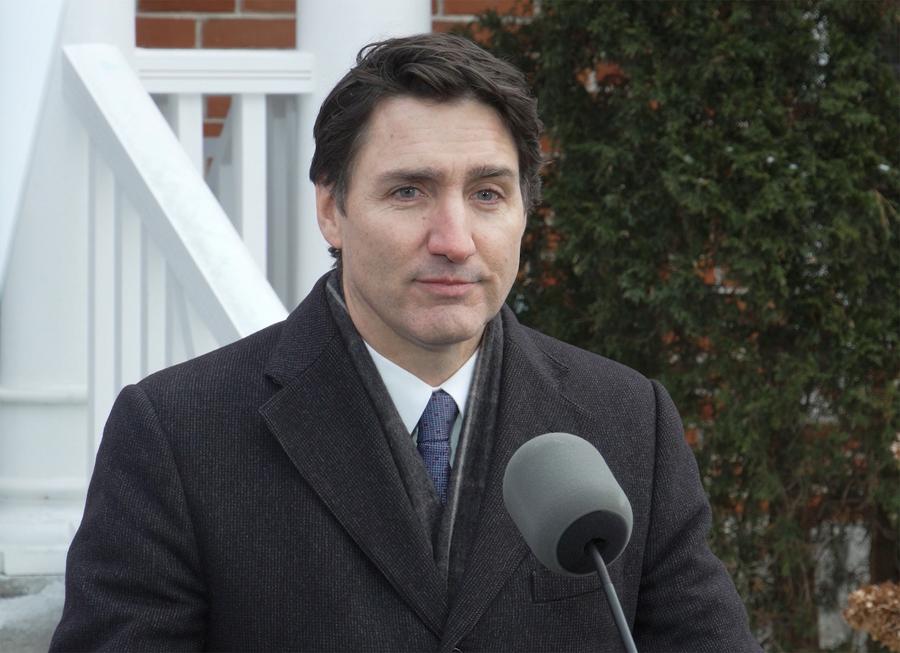
The screenshot from a video shows Canadian Prime Minister Justin Trudeau speaking to media in Ottawa, Canada, on Jan. 6, 2025. (Photo by Mick Gzowski/Xinhua)
CANADA "NEVER BACK DOWN"
Since winning the November election, Trump has repeatedly raised the idea of making Canada "the 51st state." He brought up the issue again on Tuesday, suggesting that he might consider using economic pressure to acquire Canada.
On Wednesday, Canadian Prime Minister Justin Trudeau said that Trump's proposal was a tactic to distract attention from the potential impact of his proposed tariffs.
Trump, who has long complained about Canada's trade surplus with the United States, has threatened to impose a 25-percent tariff on Canadian imports.
"What I think is happening in this is President Trump, who is a very skillful negotiator, is getting people to be somewhat distracted by that conversation," Trudeau told CNN when asked about Trump's comments.
The outgoing prime minister had previously said there isn't "a snowball's chance in hell that Canada would become part of the United States."
"Workers and communities in both our countries benefit from being each other's biggest trading and security partner," he added.
On Tuesday, Canadian Foreign Minister Melanie Joly said on X that Trump's comments "show a complete lack of understanding of what makes Canada a strong country," adding, "We will never back down in the face of threats."
Photos
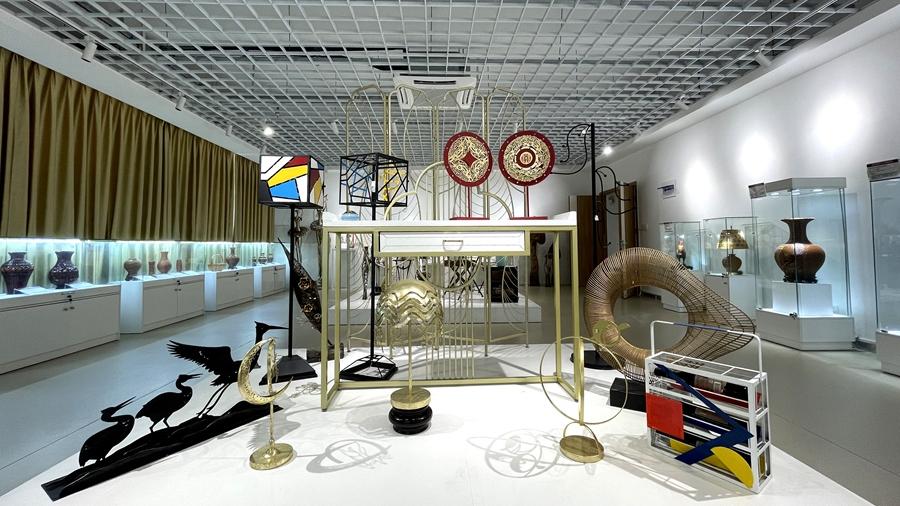 Anxi in SE China's Fujian develops rattan iron crafts into industrial chain worth over 10 bln yuan
Anxi in SE China's Fujian develops rattan iron crafts into industrial chain worth over 10 bln yuan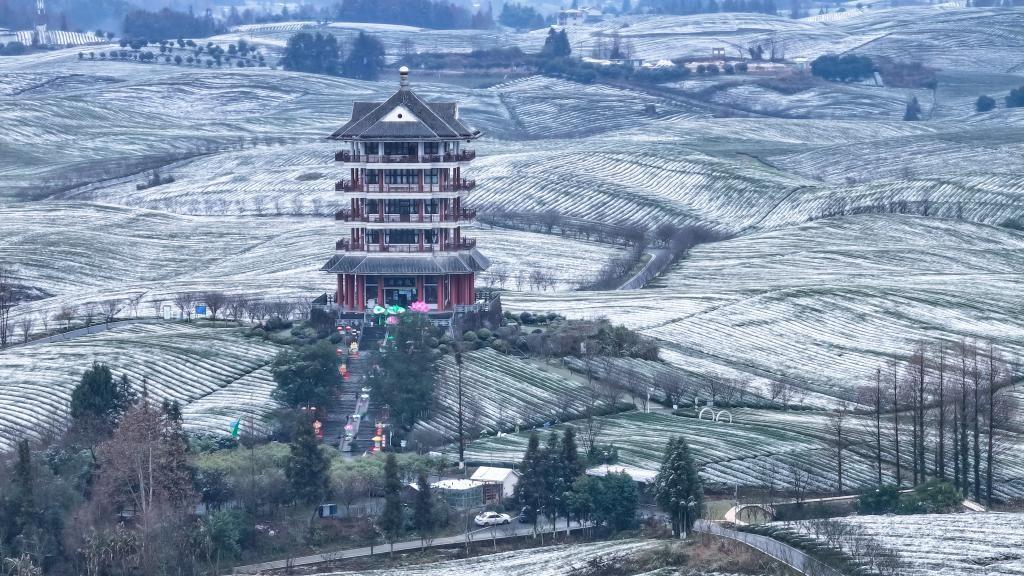 Scenery of snow-covered tea plantations in Zunyi, China's Guizhou
Scenery of snow-covered tea plantations in Zunyi, China's Guizhou Woman revitalizes intangible cultural heritage items with a stylish twist
Woman revitalizes intangible cultural heritage items with a stylish twist Cherry blossoms and birds create a winter spectacle in SW China's Yunnan
Cherry blossoms and birds create a winter spectacle in SW China's Yunnan
Related Stories
- U.S. nursing home industry wants Trump to rescind staffing mandate: NYT
- U.S. construction sector in shadow of immigration policy promised by Trump: report
- Trump's tariff threat should be taken seriously: Trudeau
- Quad's future looks dim as Trump returns
- Trump accepts Republican nomination for president, lays out second-term agenda
Copyright © 2025 People's Daily Online. All Rights Reserved.





